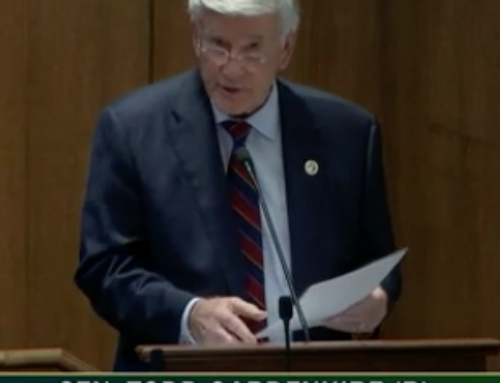TCOG Letter on Proposed OORC forms 12-14-16.
The Office of Open Records Counsel, in addition to creating a model public records policy, is proposing changes to the Schedule of Reasonable Charges, model forms and advisory opinions guidelines.
In total, nine documents, including three new forms and two new guidelines, are under revision or are new.
These documents are important because they provide guidance on what is allowed by law in the public records request process.
The main changes proposed have to do with clarifying the public records request/response process. The office is also proposing that it have new discretion on whether or not to issue Advisory Opinions, which must be posted to its website, and instead offer a new type of opinion called Advisory Comment.
After reviewing all nine documents, here are highlights of TCOG’s suggestions:
- Rework public records request form, model policy and guidelines to ensure that citizens’ public records requests received by email are honored.
- Encourage electronic copies when requested and when a government has capability of producing electronic copies.
- Rework the records response form, and other guidelines, to ensure that government entities don’t default to a “mandated” delivery of records by the U.S. Postal Service, which could slow responses to records requests. Instead, encourage electronic delivery when the government has capacity to do so, and the requester asks for this method.
- Review in more depth the need for changing the process of Advisory Opinions, and the impact of this policy.
- Define “programming fees” to extract public records from databases, which are now too arbitrarily calculated. Guidelines should be updated to better define what is allowed to be included, and what is not allowed.
- Ensure that citizens are able to inspect public records during a government entity’s business hours, and not restricted to certain days or times of the week.
TCOG earlier this month provided extensive comments on the proposed model public records policy.
“We strongly believe any rule changes should promote greater government transparency. We recommend that any changes allow for rules that are no more burdensome than state law, encourage a commitment to efficiency and prompt response, and promote the use of modern technology such as email and digitized records, which can save time and money for both the government and the public,” wrote Adam Yeomans, vice president of TCOG and its representative on the Advisory Committee.
The Advisory Committee on Open Government is made up of 14 members. They will meet at 10 a.m. Friday on the 16th Floor of the James K. Polk State Office Building, 505 Deaderick Street in Nashville, to discuss proposed changes to the policies.
Below is the written feedback provided by TCOG.
Comments from Tennessee Coalition for Open Government (12-14-16)
I. Proposed new Schedule of Reasonable Charges
1. Under POLICY: General Considerations, A) we suggest that the second sentence would be more clear, and less likely for misinterpretation if it read, “The following schedule of reasonable charge should not be interpreted as requiring a governmental entity to impose charges for copies of public records.” The sentence as now reads that it should not be interpreted as requiring a governmental entity to adopt a policy that requires charges. We think the principle that charges are not required by law needs to be strongly stated and straightforward.
2. Under POLICY: General Considerations, C), we appreciate the guidance that application of charges should not be arbitrary. But we are concerned that the schedule should limit the records custodian’s discretion to waive charges “only” if they have written language that specifically allows a waiver in their policy. Might there be times when a waiver is desired, reasonable and the right thing to do, but a records policy seems to hamstring the custodian from doing the right thing?
The schedule already notes that application of the charges should not be arbitrary. Arbitrary is not the always of the opposite of doing the right thing in a circumstance unforeseen in a policy. Suggested sentence instead; “Policies should include language that allows waivers, either in whole or in part, if the government entity wishes to have discretion to waive fees under certain circumstances.” We think this gets us to the same place, but with less unintended consequence.
3. Under POLICY: General Considerations, D:, when T.C.A. 10-7-506(c) is mentioned, could you make clear that this part of the statute deals with GIS maps of commercial value, and that personal and news gathering uses are exempt. We have seen this part of the statute used to justify charges for other types of records. Adding clarity here would be beneficial.
4. Under POLICY: Copying Charges, D:, this section is new “A records custodian may assess a charge for a duplex copy equivalent of the charge for two (2) separate copies.” We would like more clarity about what this means. Do you mean to say that if a custodian makes a front-back copy, that they can charge for 2 pages? (30 cents instead of 15 cents, for b&w)? If all are in agreement with that, could this be spelled out more clearly, perhaps with an example.
5. Under POLICY: Additional Production Charges: B., we are concerned that the language favors and even mandates mailing records by U.S. Postal Service instead of delivering records by email / electronically. The language even emphasizes that it’s the custodian’s discretion whether or not to depart from a U.S. Postal Service delivery standard.
We don’t think this is efficient, and language should instead encourage efficiency and speed.
We need to recognize the fact that many copy machines in many government offices have capacity to take a paper copy and create a digital copy. This is usually referred to as “scanning to PDF”. The Office would be promoting efficiency and compliance with prompt responses through language that urged government entities to create electronic copies and deliver copies electronically if they have the capacity to do so and the requester prefers this.
The three main reasons for our suggestion are:
- Cost-savings to government from the reduction of paperwork
- Fulfillment of the TPRA’s requirement that records be provided promptly, and;
- Reduction of mailing costs through the postal service.
Obviously, mailing something through the U.S. Postal Service not only requires additional charges, but also adds at least 2 or 3 days to the response to the request. We suggest reducing such bureaucracy and delays.
If a paper record is being scanned into a PDF copy so that it can be handled electronically (and more efficiently), it could be subject to the same reasonable labor fees as producing a paper copy.
II. Proposed new Reasonable Charges for Frequent and Multiple Requests
Under II, Charges for Aggregated Requests, C, we think that draft meeting minutes should be included in the items that should be exempt from the frequent and multiple requests policy, especially since many government entities do not make draft minutes available on their websites. Draft meeting minutes are often the only available record of what happened at a meeting, and if a citizen has to wait a month (or more) before the next governing body meeting in which minutes are approved, there is little way to find out how their representatives voted and other discussion at the meeting. So an interested citizen might make multiple requests for draft minutes from meetings, or committee meetings. This seems to much like other records that are exempt from the policy.
III: Proposed new Safe Harbor Policy
If changes are made to the other requested forms and Schedule of Reasonable Fees, we have no issues with the Safe Harbor Policy.
IV: Proposed new Best Practices & Guidelines and Model Public Records Policy (comments submitted separately)
V. Proposed new Informal Advisory Opinion Guidelines
Since this is a completely new guideline, this deserves more discussion.
We would like to have more information as to why the Office of Open Records Counsel feels a need to depart from clear language in the law that says “the office of open records counsel shall answer questions and issue informal advisory opinions as expeditiously as possible to any person, including local government officials, members of the public and the media.…” and that “any opinion issued by the office of open records counsel shall be posted on the office’s website.”
The clear language indicates that any citizen can request an advisory opinion and that the answer should be posted on the website. However, if the citizen (or government official) just wants to ask a question, short of asking for an advisory opinion, the office already has authority to answer questions without posting the answer to the website as an advisory opinion.
Why is there a need to create a new category of “advisory comment”, which is not included in the law? And what legal weight — if any — would this carry in any litigation. How is this different from answering questions?
The benefit behind an advisory opinion was that the Office of Open Records Counsel, when providing a legal opinion, would post the opinion and legal reasoning supporting this opinion on the website for all to see. A citizen, or a government official, could take the published written advisory opinion, and point to it as a way to help solve any dispute about access to records.
In this manner, legal opinions from the office would be transparent.
We are further confused because the office in the past two years has dramatically reduced the number of advisory opinions. In 2015, one advisory opinion was posted on its website. There have been zero in 2016. That compares with previous years when there were at least three or four opinions posted, and some years, more than 10. Perhaps there can be a discussion about why that number has dropped.
At this time, we cannot support this new guideline, without information as to the need or justification, especially since on the face of it, it appears contrary to state law.
VI: Proposed new Mediation of Public Records Disputes
We are encouraged that the Office of Open Records Counsel is making it better known that informal mediation is an alternative way to resolve disputes, and appreciate the efforts here. The guidelines appear reasonable.
FORMS
A. Proposed new Public Records Request Form
Under “Delivery Preference,” could we add what is often the most requested preference with a checkbox: Electronic.
B. Proposed new Estimate and Invoice for Copies or Duplicates
1. Under Estimate, c:, we suggest including the most common method preferred by requesters in receiving electronic records, which is “electronic”. Can a checkbox be added for “electronic?”
2. Under “Estimate of Total Cost” (3), we have questions about this language: “Programming cost to extract information requested.” This is also listed under “Total Cost” (c.)
We understand that this language was picked up from the previous Inspection / Duplication of Records Request form, last updated on 12/2010.
However, this is an example of a fee that can and has been too easily abused. We have experienced complaints from requesters about “programming fees” that appear arbitrary and are unexplained. With no limits, an arbitrary programming fee is contrary to guidelines required in establishing the Schedule of Reasonable Fees, which states, “That excessive fees and other rules shall not be used to hinder access to nonexempt public information.”
If a programming fee is to be charged, we believe there needs to be explicit instructions as to what can be included in the fee. For example, we do not believe the cost of the computer system should be factored into the fee (as it is not in any other fees). Nor do we believe the “time spent” by the computer processing the program should be included. Honestly, we’re at a loss as to what should be reasonably included other that the per-hour labor rates of any programmer or programmers. Certainly, the arbitrary and unlimited nature of a programming fee invites an escalation of charges that could “hinder access to nonexempt public information.”
C: Proposed new Public Records Response Form
At the beginning of this form, a space is made available to indicate the location and date/time that a public record will be made available for inspection.
It is reasonable for a government entity and a requester to discuss a potential time for a requester to come inspect a public record. But we are concerned here that the form will suggest that a government entity can dictate when it makes public records available under the law.
The law, of course, states:
All state, county and municipal records shall, at all times during business hours, which for public hospitals shall be during the business hours of their administrative offices, be open for personal inspection by any citizen of this state, and those in charge of the records shall not refuse such right of inspection to any citizen, unless otherwise provided by state law.
We have had some complaints from requesters who have said they were given a time/date to come inspect a public record, and they could not make that particular time/date, and that the government entity was unresponsive in allowing the requester to set a different time.
We feel certain that such high-handed rigidity is not the guidance from the Office of Open Records Counsel. But we do seek some help from the Office here in protecting the citizen so that it is not suggested that the citizen has no recourse if they cannot come at 2 p.m. on the third Tuesday of the month to look at records.
Could the language be altered slightly to say the records will be available for inspection beginning at Time/Date/Location, and if the requester cannot come to see the records for several days, he/she should contact the office to settle upon an agreeable time or appointment.




